Deck 6: Elasticity and Demand
Question
Question
Question
Question
Question
Question
Question
Question
Question
Question
Question
Question
Question
Question
Question
Question
Question
Question
Question
Question
Question
Question
Question
Question
Question
Question
Question
Question
Question
Question
Question
Question
Question
Question
Question
Question
Question
Question
Question
Question
Question
Question
Question
Question
Question
Question
Question
Question
Question
Question
Question
Question
Question
Question
Question
Question
Question
Question
Question
Question
Question
Question
Question
Question
Question
Question
Question
Question
Question
Question
Question
Question
Question
Question
Question
Question
Question

Unlock Deck
Sign up to unlock the cards in this deck!
Unlock Deck
Unlock Deck
1/77
Play
Full screen (f)
Deck 6: Elasticity and Demand
1
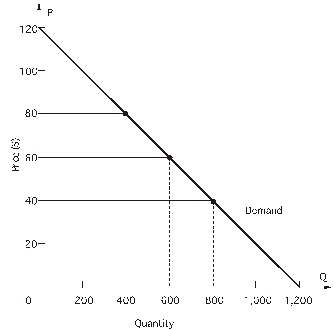
-In the figure above, what is the point price elasticity of demand when price is $60?
A) -0.50
B) -0.75
C) -1.00
D) -1.60
E) -2.00
-1.00
2
When marginal revenue is positive,
A) demand is elastic.
B) marginal revenue is greater than price.
C) decreasing price will decrease total revenue.
D) both b and c
E) all of the above
A) demand is elastic.
B) marginal revenue is greater than price.
C) decreasing price will decrease total revenue.
D) both b and c
E) all of the above
demand is elastic.
3

-What is demand elasticity over the price range $40 to $60?
A) -2.00
B)-1.00
C) -0.50
D) -0.95
E) -0.71
-0.71
4
Marginal revenue
A) is the change in total revenue when output increases by one unit.
B) is always greater than zero.
C) measures the slope of the total revenue curve.
D) both a and c
E) all of the above
A) is the change in total revenue when output increases by one unit.
B) is always greater than zero.
C) measures the slope of the total revenue curve.
D) both a and c
E) all of the above

Unlock Deck
Unlock for access to all 77 flashcards in this deck.
Unlock Deck
k this deck
5
The cross-price elasticity of demand between goods X and Y
A) measures the responsiveness of the quantity of X demanded to changes in the price of Y.
B) is the percentage change in the price of Y divided by the percentage change in the quantity of X demanded.
C) is greater than zero if X and Y are substitutes.
D) both a and c
E) all of the above
A) measures the responsiveness of the quantity of X demanded to changes in the price of Y.
B) is the percentage change in the price of Y divided by the percentage change in the quantity of X demanded.
C) is greater than zero if X and Y are substitutes.
D) both a and c
E) all of the above

Unlock Deck
Unlock for access to all 77 flashcards in this deck.
Unlock Deck
k this deck
6

-If price INCREASES from $40 to $60, an arrow representing the PRICE effect
A) will point upward.
B) will point downward.
C) will be longer than (and in opposite direction of) the arrow representing the quantity effect.
D) will be shorter than (and in the opposite direction of) the arrow representing the quantity effect.
E) both a and c

Unlock Deck
Unlock for access to all 77 flashcards in this deck.
Unlock Deck
k this deck
7
Use the figure below, which shows a linear demand curve and the associated total revenue curve, to answer the questions.
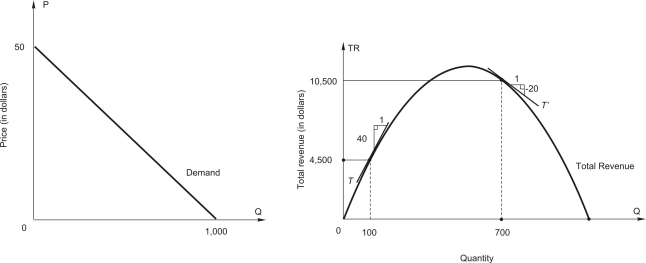
-The marginal revenue of the 700th unit is $_____ and demand is __________ at this point.
A) -20; elastic
B) -20; inelastic
C) 15; elastic
D) 15; inelastic

-The marginal revenue of the 700th unit is $_____ and demand is __________ at this point.
A) -20; elastic
B) -20; inelastic
C) 15; elastic
D) 15; inelastic

Unlock Deck
Unlock for access to all 77 flashcards in this deck.
Unlock Deck
k this deck
8

-In the figure above, what is the point price elasticity of demand when price is $80?
A) -0.50
B) -0.75
C) -1.00
D) -1.60
E) -2.00

Unlock Deck
Unlock for access to all 77 flashcards in this deck.
Unlock Deck
k this deck
9

-In the figure above, what is the point price elasticity of demand when price is $40?
A) -0.50
B) -0.75
C) -1.00
D) -1.50
E) -2.00

Unlock Deck
Unlock for access to all 77 flashcards in this deck.
Unlock Deck
k this deck
10
Which of the following will NOT affect the elasticity of demand for a product?
A) the number of substitutes
B) how long consumers have to adapt to price changes
C) the cost of producing the product
D) the percentage of the consumer's budget spent on the product
E) all of the above will affect the elasticity of demand for a product
A) the number of substitutes
B) how long consumers have to adapt to price changes
C) the cost of producing the product
D) the percentage of the consumer's budget spent on the product
E) all of the above will affect the elasticity of demand for a product

Unlock Deck
Unlock for access to all 77 flashcards in this deck.
Unlock Deck
k this deck
11

-If price DECREASES from $80 to $60, an arrow representing the QUANTITY effect
A) will point upward.
B) will point downward.
C) will be shorter than (and in the opposite direction of) the arrow representing the price effect.
D) will be shorter than (and in the same direction of) the arrow representing the price effect.
E) will point in the opposite direction in which total revenue will move.

Unlock Deck
Unlock for access to all 77 flashcards in this deck.
Unlock Deck
k this deck
12
Use the figure below, which shows a linear demand curve and the associated total revenue curve, to answer the questions.

-The maximum possible total revenue is $_________.
A) 10,500
B) 11,000
C) 11,500
D) 12,000
E) 12,500

-The maximum possible total revenue is $_________.
A) 10,500
B) 11,000
C) 11,500
D) 12,000
E) 12,500

Unlock Deck
Unlock for access to all 77 flashcards in this deck.
Unlock Deck
k this deck
13

-If price INCREASES from $60 to $80, an arrow representing the PRICE effect
A) will point upward.
B) will point downward.
C) will be longer than (and in opposite direction of) the arrow representing the quantity effect.
D) will be shorter than (and in the opposite direction of) the arrow representing the quantity effect.
E) both a and d

Unlock Deck
Unlock for access to all 77 flashcards in this deck.
Unlock Deck
k this deck
14

-If price DECREASES from $60 to $40, an arrow representing the QUANTITY effect
A) will point downward.
B) will be shorter than (and in opposite direction of) the arrow representing the price effect.
C) will be shorter than (and in same direction of) the arrow representing the price effect.
D) will point in the direction in which total revenue will move.
E) both a and d

Unlock Deck
Unlock for access to all 77 flashcards in this deck.
Unlock Deck
k this deck
15
Use the figure below, which shows a linear demand curve and the associated total revenue curve, to answer the questions.

-The price at which total revenue is maximized is $_____.
A) 10
B) 15
C) 20
D) 25
E) 30

-The price at which total revenue is maximized is $_____.
A) 10
B) 15
C) 20
D) 25
E) 30

Unlock Deck
Unlock for access to all 77 flashcards in this deck.
Unlock Deck
k this deck
16
Use the figure below, which shows a linear demand curve and the associated total revenue curve, to answer the questions.

-The Interior Department recently announced that it will increase the entrance fees at Yellowstone National Park in order to increase park revenues. The Interior Department must believe that
A) park goers are very responsive to price changes.
B) the demand for park services is elastic.
C) the percentage increase in fees will be greater than the percentage decrease in the number of park visitors.
D) demand is unitary elastic, and thus the number of visitors will NOT decrease.

-The Interior Department recently announced that it will increase the entrance fees at Yellowstone National Park in order to increase park revenues. The Interior Department must believe that
A) park goers are very responsive to price changes.
B) the demand for park services is elastic.
C) the percentage increase in fees will be greater than the percentage decrease in the number of park visitors.
D) demand is unitary elastic, and thus the number of visitors will NOT decrease.

Unlock Deck
Unlock for access to all 77 flashcards in this deck.
Unlock Deck
k this deck
17
Use the figure below, which shows a linear demand curve and the associated total revenue curve, to answer the questions.

-The marginal revenue of the 100th unit is $_____.
A) 0
B) 20
C) 40
D) 50
E) cannot tell from the information provided

-The marginal revenue of the 100th unit is $_____.
A) 0
B) 20
C) 40
D) 50
E) cannot tell from the information provided

Unlock Deck
Unlock for access to all 77 flashcards in this deck.
Unlock Deck
k this deck
18
If the demand for umbrellas is price inelastic,
A) changes in price do not affect the number of umbrellas demanded.
B) if more umbrellas are sold as the result of a price decrease, total expenditures by consumers on umbrellas will decrease.
C) the percentage change in price is less than the percentage change in quantity demanded.
D) the percentage change in quantity demanded is greater than the percentage change in price.
E) none of the above
A) changes in price do not affect the number of umbrellas demanded.
B) if more umbrellas are sold as the result of a price decrease, total expenditures by consumers on umbrellas will decrease.
C) the percentage change in price is less than the percentage change in quantity demanded.
D) the percentage change in quantity demanded is greater than the percentage change in price.
E) none of the above

Unlock Deck
Unlock for access to all 77 flashcards in this deck.
Unlock Deck
k this deck
19

-What is the interval elasticity of demand over the price range $60 to $80?
A) -0.75
B) -1.10
C) -1.00
D) -1.40
E) -2.00

Unlock Deck
Unlock for access to all 77 flashcards in this deck.
Unlock Deck
k this deck
20
Use the figure below, which shows a linear demand curve and the associated total revenue curve, to answer the questions.

-The price for which 100 units can be sold is $_____.
A) 10
B) 15
C) 25
D) 45
E) 50

-The price for which 100 units can be sold is $_____.
A) 10
B) 15
C) 25
D) 45
E) 50

Unlock Deck
Unlock for access to all 77 flashcards in this deck.
Unlock Deck
k this deck
21
Refer to the following table showing a demand schedule:
-If price falls from $200 to $150, what is the elasticity of demand over this range?
A) -0.625
B) -1.0
C) -1.17
D) -.5
E) -3.0
-If price falls from $200 to $150, what is the elasticity of demand over this range?
A) -0.625
B) -1.0
C) -1.17
D) -.5
E) -3.0

Unlock Deck
Unlock for access to all 77 flashcards in this deck.
Unlock Deck
k this deck
22
Refer to the following table showing a demand schedule:
-If price falls from $200 to $150,
A) arrows representing the price and quantity effects both point down.
B) an arrow representing the price effect points down and is longer than an arrow for the quantity effect.
C) an arrow representing the price effect points down and is shorter than an arrow for the quantity effect.
D) arrows representing the price and quantity effects both point up.
E) total revenue moves in the same direction as the arrow representing the price effect.
-If price falls from $200 to $150,
A) arrows representing the price and quantity effects both point down.
B) an arrow representing the price effect points down and is longer than an arrow for the quantity effect.
C) an arrow representing the price effect points down and is shorter than an arrow for the quantity effect.
D) arrows representing the price and quantity effects both point up.
E) total revenue moves in the same direction as the arrow representing the price effect.

Unlock Deck
Unlock for access to all 77 flashcards in this deck.
Unlock Deck
k this deck
23
When the price of corn dogs is $0.50, 10,000 corn dogs are demanded. When the price of corn dogs is $1.20, 5,000 are demanded. What is the price elasticity of demand for corn dogs?
A) -0.40
B) -0.81
C) -1.20
D) -1.40
A) -0.40
B) -0.81
C) -1.20
D) -1.40

Unlock Deck
Unlock for access to all 77 flashcards in this deck.
Unlock Deck
k this deck
24
If the quantity of Harley-Davidson motorcycles demanded decreases by 10% when the price increases by 20%, the price elasticity of demand for Harley-Davidson motorcycles is:
A) -0.50
B) -2.0
C) -10.0
D) -20.0
A) -0.50
B) -2.0
C) -10.0
D) -20.0

Unlock Deck
Unlock for access to all 77 flashcards in this deck.
Unlock Deck
k this deck
25
Refer to the following table showing a demand schedule:
-If price falls from $200 to $150,
A) arrows representing the price and quantity effects both point down.
B) an arrow representing the price effect points down and is longer than an arrow for the quantity effect.
C) an arrow representing the quantity effect points up and is shorter than an arrow for the price effect.
D) arrows representing the price and quantity effects both point up.
E) total revenue moves in the same direction as the arrow representing the quantity effect.
-If price falls from $200 to $150,
A) arrows representing the price and quantity effects both point down.
B) an arrow representing the price effect points down and is longer than an arrow for the quantity effect.
C) an arrow representing the quantity effect points up and is shorter than an arrow for the price effect.
D) arrows representing the price and quantity effects both point up.
E) total revenue moves in the same direction as the arrow representing the quantity effect.

Unlock Deck
Unlock for access to all 77 flashcards in this deck.
Unlock Deck
k this deck
26
Use the figure to calculate the income elasticity of demand when income increases from $25,000 to $30,000:
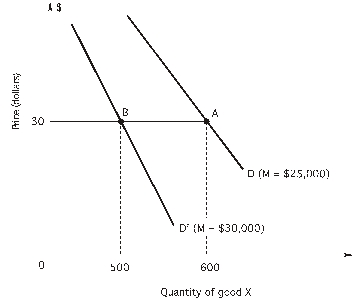
A) -1.0
B) -0.1818
C) 0.1818
D) -1.5
E) 1.2

A) -1.0
B) -0.1818
C) 0.1818
D) -1.5
E) 1.2

Unlock Deck
Unlock for access to all 77 flashcards in this deck.
Unlock Deck
k this deck
27
Refer to the following table showing a demand schedule:
-If price falls from $150 to $100,
A) arrows representing the price and quantity effects both point down.
B) an arrow representing the price effect points down and is shorter than an arrow for the quantity effect.
C) total revenue moves in the same direction as the arrow representing the price effect.
D) the arrow representing the price effect points down and the arrow representing the quantity effect points up.
E) both c and d
-If price falls from $150 to $100,
A) arrows representing the price and quantity effects both point down.
B) an arrow representing the price effect points down and is shorter than an arrow for the quantity effect.
C) total revenue moves in the same direction as the arrow representing the price effect.
D) the arrow representing the price effect points down and the arrow representing the quantity effect points up.
E) both c and d

Unlock Deck
Unlock for access to all 77 flashcards in this deck.
Unlock Deck
k this deck
28
Refer to the following table showing a demand schedule:
-If price rises from $100 to $150,
A) arrows representing the price and quantity effects both point upward.
B) an arrow representing the price effect points upward and is shorter than an arrow for the quantity effect, which points downward.
C) total revenue moves up, or increase, as indicated by the direction of the arrow representing the price effect.
D) the arrow representing the price effect points down and the arrow representing the quantity effect points up.
E) both c and d
-If price rises from $100 to $150,
A) arrows representing the price and quantity effects both point upward.
B) an arrow representing the price effect points upward and is shorter than an arrow for the quantity effect, which points downward.
C) total revenue moves up, or increase, as indicated by the direction of the arrow representing the price effect.
D) the arrow representing the price effect points down and the arrow representing the quantity effect points up.
E) both c and d

Unlock Deck
Unlock for access to all 77 flashcards in this deck.
Unlock Deck
k this deck
29
When demand is inelastic,
A) quantity sold does not increase when price decreases.
B) selling one more unit of output causes marginal revenue to increase.
C) selling one more unit of output cause total revenue to increase.
D) Buyers are not very responsive to changes in the price of the product.
E) The percentage change in quantity demanded will exceed the percentage change in price (in absolute value).
A) quantity sold does not increase when price decreases.
B) selling one more unit of output causes marginal revenue to increase.
C) selling one more unit of output cause total revenue to increase.
D) Buyers are not very responsive to changes in the price of the product.
E) The percentage change in quantity demanded will exceed the percentage change in price (in absolute value).

Unlock Deck
Unlock for access to all 77 flashcards in this deck.
Unlock Deck
k this deck
30
The demand for heart surgery is price inelastic. So it follows that
A) the percentage change in price is less than the resulting percentage change in quantity demanded.
B) if the price of heart surgery increases, total expenditure by consumers on heart surgery will rise.
C) changes in price do not affect the number of operations demanded.
D) both a and b
E) all of the above
A) the percentage change in price is less than the resulting percentage change in quantity demanded.
B) if the price of heart surgery increases, total expenditure by consumers on heart surgery will rise.
C) changes in price do not affect the number of operations demanded.
D) both a and b
E) all of the above

Unlock Deck
Unlock for access to all 77 flashcards in this deck.
Unlock Deck
k this deck
31
If the price elasticity of DVD recorders is -0.3 and price increases 20%, what happens to the quantity of DVD recorders demanded?
A) quantity decreases by 26%
B) quantity decreases by 6%
C) quantity increases by 15%
D) quantity increases by 21%
A) quantity decreases by 26%
B) quantity decreases by 6%
C) quantity increases by 15%
D) quantity increases by 21%

Unlock Deck
Unlock for access to all 77 flashcards in this deck.
Unlock Deck
k this deck
32
Suppose that the Houston Rockets' management is considering a plan in which fans who donate blood can attend games for $35 instead of the usual $40. If both ticket revenues and blood donations rise with this plan, which of the following is true?
A) The demand for Houston Rockets' tickets is price elastic.
B) The demand for Houston Rockets' tickets is price inelastic.
C) The demand for blood donations is price elastic.
D) The demand for blood donations is price inelastic.
A) The demand for Houston Rockets' tickets is price elastic.
B) The demand for Houston Rockets' tickets is price inelastic.
C) The demand for blood donations is price elastic.
D) The demand for blood donations is price inelastic.

Unlock Deck
Unlock for access to all 77 flashcards in this deck.
Unlock Deck
k this deck
33
If the price elasticity of demand for Harley-Davidson motorcycles is -1.2 and quantity demanded increases by 24%, price must have
A) decreased by 20%.
B) increased by 20%.
C) decreased by 28.8%.
D) decreased by 0.05%.
A) decreased by 20%.
B) increased by 20%.
C) decreased by 28.8%.
D) decreased by 0.05%.

Unlock Deck
Unlock for access to all 77 flashcards in this deck.
Unlock Deck
k this deck
34
Use the figure to calculate the income elasticity of demand when income increases from $25,000 to $30,000:
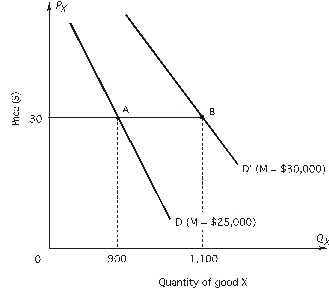
A) -0.10
B) -1.10
C) 0.1818
D) 0.20
E) 1.10

A) -0.10
B) -1.10
C) 0.1818
D) 0.20
E) 1.10

Unlock Deck
Unlock for access to all 77 flashcards in this deck.
Unlock Deck
k this deck
35
If the price elasticity of demand for a good is -0.8 and quantity demanded decreases by 40%, price must have
A) increased by 5%.
B) increased by 32%.
C) decreased by 20%.
D) decreased by 32%.
E) none of the above
A) increased by 5%.
B) increased by 32%.
C) decreased by 20%.
D) decreased by 32%.
E) none of the above

Unlock Deck
Unlock for access to all 77 flashcards in this deck.
Unlock Deck
k this deck
36
If the quantity of gidgets demanded increases when the price of gadgets decreases
A) gidgets and gadgets are substitutes.
B) gidgets and gadgets are complements.
C) gidgets are normal goods, while gadgets are inferior goods.
D) gadgets are normal goods, while gidgets are inferior goods.
A) gidgets and gadgets are substitutes.
B) gidgets and gadgets are complements.
C) gidgets are normal goods, while gadgets are inferior goods.
D) gadgets are normal goods, while gidgets are inferior goods.

Unlock Deck
Unlock for access to all 77 flashcards in this deck.
Unlock Deck
k this deck
37
Refer to the following table showing a demand schedule:
-As output rises from 1,400 to 1,800, what is marginal revenue?
A) $25
B) $50
C) -$400
D) -$50
E) -$75
-As output rises from 1,400 to 1,800, what is marginal revenue?
A) $25
B) $50
C) -$400
D) -$50
E) -$75

Unlock Deck
Unlock for access to all 77 flashcards in this deck.
Unlock Deck
k this deck
38
Refer to the following table showing a demand schedule:
-If price falls from $150 to $100, what is the elasticity of demand over this range?
A) -0.625
B) -1.0
C) -1.17
D) -2.5
E) -3.0
-If price falls from $150 to $100, what is the elasticity of demand over this range?
A) -0.625
B) -1.0
C) -1.17
D) -2.5
E) -3.0

Unlock Deck
Unlock for access to all 77 flashcards in this deck.
Unlock Deck
k this deck
39
Refer to the following table showing a demand schedule:
-As output increases from 1,000 to 1,400 what is marginal revenue?
A) $25
B) $50
C) -$400
D) -$25
E) -$75
-As output increases from 1,000 to 1,400 what is marginal revenue?
A) $25
B) $50
C) -$400
D) -$25
E) -$75

Unlock Deck
Unlock for access to all 77 flashcards in this deck.
Unlock Deck
k this deck
40
Use the figure below to calculate the cross-price elasticity of demand for good X when the price of good Y increases from $12 to $14:
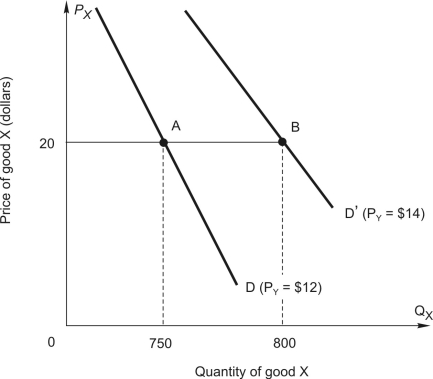
A) 0.645
B) 0.42
C) 0.20
D) 2.00
E) 15.38

A) 0.645
B) 0.42
C) 0.20
D) 2.00
E) 15.38

Unlock Deck
Unlock for access to all 77 flashcards in this deck.
Unlock Deck
k this deck
41
Demand is (more elastic / less elastic) in the short run than in the long run
A) (more elastic) because goods account for a larger percentage of the consumer's budget in the short run than in the long run.
B) (less elastic) because goods account for a smaller percentage of the consumer's budget in the short run than in the long run.
C) (more elastic) because consumers have less time to adapt to a price change in the short run than in the long run.
D) (less elastic) because consumers have less time to adapt to a price change in the short run than in the long run.
A) (more elastic) because goods account for a larger percentage of the consumer's budget in the short run than in the long run.
B) (less elastic) because goods account for a smaller percentage of the consumer's budget in the short run than in the long run.
C) (more elastic) because consumers have less time to adapt to a price change in the short run than in the long run.
D) (less elastic) because consumers have less time to adapt to a price change in the short run than in the long run.

Unlock Deck
Unlock for access to all 77 flashcards in this deck.
Unlock Deck
k this deck
42
Refer to the following graph:
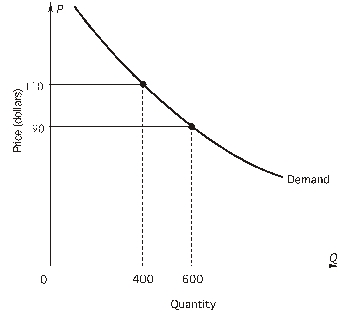
-Suppose price rises from $90 to $110. Using representative arrows, the quantity effect is a relatively ________ (short, long) arrow pointing _______ (upward, downward).
A) short; upward
B) short; downward
C) long; upward
D) long; downward

-Suppose price rises from $90 to $110. Using representative arrows, the quantity effect is a relatively ________ (short, long) arrow pointing _______ (upward, downward).
A) short; upward
B) short; downward
C) long; upward
D) long; downward

Unlock Deck
Unlock for access to all 77 flashcards in this deck.
Unlock Deck
k this deck
43
Refer to the following graph:

-The price elasticity of demand over the price interval $90 to $110 is
A) -0.5
B) -1.0
C) -1.5
D) -2.0
E) -0.4

-The price elasticity of demand over the price interval $90 to $110 is
A) -0.5
B) -1.0
C) -1.5
D) -2.0
E) -0.4

Unlock Deck
Unlock for access to all 77 flashcards in this deck.
Unlock Deck
k this deck
44
"When the British government tripled university fees for foreign students in Great Britain, about one-half of them left to study in other countries."
-The implied price elasticity of demand by foreigners for a British education is (in absolute value)
A) less than 1.
B) equal to 1.
C) between 1.0 and 1.5.
D) greater than 1.5.

Unlock Deck
Unlock for access to all 77 flashcards in this deck.
Unlock Deck
k this deck
45
Perfume industry statistics show that over the past five years, the number of bottles of perfume sold decreased by 30%, but the total dollar amount spent by consumers was unchanged. This means that
A) consumers were unresponsive to changes in price, i.e., the percentage change in quantity demanded was less than the percentage change in price.
B) demand was elastic.
C) demand was inelastic.
D) demand was unitary elastic.
E) both a and c
A) consumers were unresponsive to changes in price, i.e., the percentage change in quantity demanded was less than the percentage change in price.
B) demand was elastic.
C) demand was inelastic.
D) demand was unitary elastic.
E) both a and c

Unlock Deck
Unlock for access to all 77 flashcards in this deck.
Unlock Deck
k this deck
46
If a drought increases the price of corn by 10% and decreases the quantity of corn demanded by 5%, then demand for corn is
A) elastic and total revenue to corn farmers will decrease.
B) inelastic and total revenue to corn farmers will decrease.
C) elastic and total revenue to corn farmers will increase.
D) inelastic and total revenue to corn farmers will increase.
A) elastic and total revenue to corn farmers will decrease.
B) inelastic and total revenue to corn farmers will decrease.
C) elastic and total revenue to corn farmers will increase.
D) inelastic and total revenue to corn farmers will increase.

Unlock Deck
Unlock for access to all 77 flashcards in this deck.
Unlock Deck
k this deck
47
Refer to the following graph:

-Suppose price rises from $90 to $110. Total revenue moves in the ________ (same, opposite) direction as the dominant effect. In this case, total revenue ____________ (increases, decreases, stays the same) because the quantity effect is _________ (larger than, smaller than, the same as) the price effect.
A) same; increases; larger than
B) same; decreases; smaller than
C) same; decreases; larger than
D) opposite; increases; larger than
E) opposite; decreases; smaller than

-Suppose price rises from $90 to $110. Total revenue moves in the ________ (same, opposite) direction as the dominant effect. In this case, total revenue ____________ (increases, decreases, stays the same) because the quantity effect is _________ (larger than, smaller than, the same as) the price effect.
A) same; increases; larger than
B) same; decreases; smaller than
C) same; decreases; larger than
D) opposite; increases; larger than
E) opposite; decreases; smaller than

Unlock Deck
Unlock for access to all 77 flashcards in this deck.
Unlock Deck
k this deck
48
Which of the following would tend to DECREASE the elasticity of demand for good X?
A) The cost of producing X decreases.
B) Several firms which used to produce substitutes for X go out of business.
C) Consumers begin spending a smaller percentage of their income on X.
D) both b and c
E) all of the above
A) The cost of producing X decreases.
B) Several firms which used to produce substitutes for X go out of business.
C) Consumers begin spending a smaller percentage of their income on X.
D) both b and c
E) all of the above

Unlock Deck
Unlock for access to all 77 flashcards in this deck.
Unlock Deck
k this deck
49
The fact that the cross-price elasticity of natural gas with respect to the price of fuel oil is 0.4 implies that
A) natural gas and fuel oil are substitutes.
B) natural gas is a normal good.
C) the quantity of natural gas demanded will decrease by 1.6% when the price of fuel oil decreases by 4%.
D) both a and c
A) natural gas and fuel oil are substitutes.
B) natural gas is a normal good.
C) the quantity of natural gas demanded will decrease by 1.6% when the price of fuel oil decreases by 4%.
D) both a and c

Unlock Deck
Unlock for access to all 77 flashcards in this deck.
Unlock Deck
k this deck
50
Which of the following would tend to INCREASE the elasticity of demand for good X?
A) a new discovery allows firms to produce X at a much lower cost.
B) the percent of a consumer's income spent on good X declines.
C) a new product, Y, which can be used in place of X, is introduced.
D) both b and c
E) all of the above
A) a new discovery allows firms to produce X at a much lower cost.
B) the percent of a consumer's income spent on good X declines.
C) a new product, Y, which can be used in place of X, is introduced.
D) both b and c
E) all of the above

Unlock Deck
Unlock for access to all 77 flashcards in this deck.
Unlock Deck
k this deck
51
Refer to the following graph:

-Over the price range $90 to $110, marginal revenue is ________ and demand is ________.
A) greater than one; inelastic
B) positive; elastic
C) negative; inelastic
D) less than one; elastic
E) none of the above

-Over the price range $90 to $110, marginal revenue is ________ and demand is ________.
A) greater than one; inelastic
B) positive; elastic
C) negative; inelastic
D) less than one; elastic
E) none of the above

Unlock Deck
Unlock for access to all 77 flashcards in this deck.
Unlock Deck
k this deck
52
Refer to the following graph:

-Suppose price rises from $90 to $110. Using representative arrows, the price effect is a relatively ________ (short, long) arrow pointing _______ (upward, downward).
A) short; upward
B) short; downward
C) long; upward
D) long; downward

-Suppose price rises from $90 to $110. Using representative arrows, the price effect is a relatively ________ (short, long) arrow pointing _______ (upward, downward).
A) short; upward
B) short; downward
C) long; upward
D) long; downward

Unlock Deck
Unlock for access to all 77 flashcards in this deck.
Unlock Deck
k this deck
53
If E1 is the demand elasticity for a product after a price change has been in effect one day, E2 is the demand elasticity for that product after one week, and E3 is demand elasticity for that product after one month,
A) |E1| > |E2| > |E3|
B) |E2| > |E3| > |E1|
C) |E3| > |E1| > |E2|
D) |E3|> |E2| > |E1|
A) |E1| > |E2| > |E3|
B) |E2| > |E3| > |E1|
C) |E3| > |E1| > |E2|
D) |E3|> |E2| > |E1|

Unlock Deck
Unlock for access to all 77 flashcards in this deck.
Unlock Deck
k this deck
54
If the demand for plastic surgery is price inelastic,
A) changes in price do not affect the number of operations.
B) then when more plastic surgery is performed, total expenditures on plastic surgery will decrease.
C) the percentage change in price is less than the percentage change in quantity.
D) both b and c
E) both a and b
A) changes in price do not affect the number of operations.
B) then when more plastic surgery is performed, total expenditures on plastic surgery will decrease.
C) the percentage change in price is less than the percentage change in quantity.
D) both b and c
E) both a and b

Unlock Deck
Unlock for access to all 77 flashcards in this deck.
Unlock Deck
k this deck
55
"When the British government tripled university fees for foreign students in Great Britain, about one-half of them left to study in other countries."
-This move will ___________ university revenues from foreign students in Great Britain.
A) decrease
B) not change
C) increase
D) cannot determine without further information

Unlock Deck
Unlock for access to all 77 flashcards in this deck.
Unlock Deck
k this deck
56
When demand is elastic,
A) marginal revenue is negative.
B) the percentage change in price exceeds the percentage change in quantity.
C) an increase in price causes total revenue to rise.
D) both b and c
E) none of the above
A) marginal revenue is negative.
B) the percentage change in price exceeds the percentage change in quantity.
C) an increase in price causes total revenue to rise.
D) both b and c
E) none of the above

Unlock Deck
Unlock for access to all 77 flashcards in this deck.
Unlock Deck
k this deck
57
When marginal revenue is zero,
A) P < MR.
B) P = MR.
C) a small increase in price causes no change in total revenue.
D) a small decrease in price causes no change in total revenue.
E) both c and d
A) P < MR.
B) P = MR.
C) a small increase in price causes no change in total revenue.
D) a small decrease in price causes no change in total revenue.
E) both c and d

Unlock Deck
Unlock for access to all 77 flashcards in this deck.
Unlock Deck
k this deck
58
Total revenue increased for a firm operating in the elastic range of its demand curve. Which of the following statements is correct?
A) The firm must have raised price.
B) The firm must have lowered price.
C) Quantity demanded must have increased.
D) both a and c
E) both b and c
A) The firm must have raised price.
B) The firm must have lowered price.
C) Quantity demanded must have increased.
D) both a and c
E) both b and c

Unlock Deck
Unlock for access to all 77 flashcards in this deck.
Unlock Deck
k this deck
59
The demand for good X will be more elastic than the demand for good Y when
A) good X has fewer substitutes than good Y.
B) good X accounts for a larger percentage of a typical consumer's budget than good Y.
C) consumers have more time to adjust to a change in the price of good X than they have time to adjust to a change in the price of good Y.
D) both b and c
E) all of the above
A) good X has fewer substitutes than good Y.
B) good X accounts for a larger percentage of a typical consumer's budget than good Y.
C) consumers have more time to adjust to a change in the price of good X than they have time to adjust to a change in the price of good Y.
D) both b and c
E) all of the above

Unlock Deck
Unlock for access to all 77 flashcards in this deck.
Unlock Deck
k this deck
60
E1 is demand elasticity for Minutemaid orange juice, E2 is demand elasticity for all orange juice, and E3 is demand elasticity for all fruit drinks. Then
A) |E1| > |E2| > |E3|
B) |E2| > |E3| > |E1|
C) |E3| > |E1| > |E2|
D) |E3| > |E2| > |E1|
A) |E1| > |E2| > |E3|
B) |E2| > |E3| > |E1|
C) |E3| > |E1| > |E2|
D) |E3| > |E2| > |E1|

Unlock Deck
Unlock for access to all 77 flashcards in this deck.
Unlock Deck
k this deck
61
Refer to the following figure:
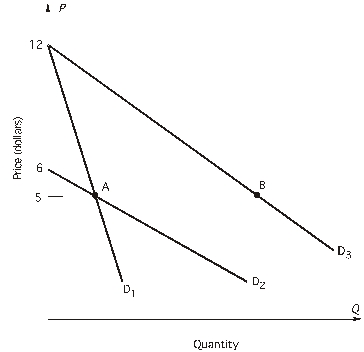
-At what prices are demand curves D1, D2, and D3 unitary elastic?
A) $5; $5; $5; respectively
B) $17; $6; $5; respectively
C) $6; $3; $6; respectively
D) $1; $1; $1; respectively

-At what prices are demand curves D1, D2, and D3 unitary elastic?
A) $5; $5; $5; respectively
B) $17; $6; $5; respectively
C) $6; $3; $6; respectively
D) $1; $1; $1; respectively

Unlock Deck
Unlock for access to all 77 flashcards in this deck.
Unlock Deck
k this deck
62
Refer to the following figure:
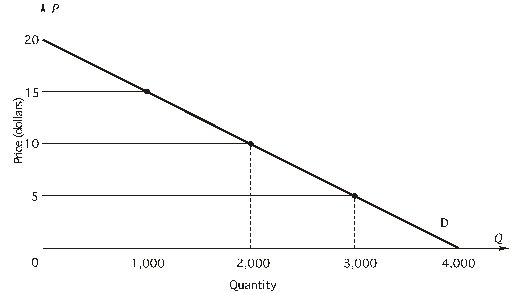
-When quantity demanded is 2,000, what is marginal revenue?
A) $12
B) $15
C) 0
D) $10
E) -$10

-When quantity demanded is 2,000, what is marginal revenue?
A) $12
B) $15
C) 0
D) $10
E) -$10

Unlock Deck
Unlock for access to all 77 flashcards in this deck.
Unlock Deck
k this deck
63
Refer to the following figure:
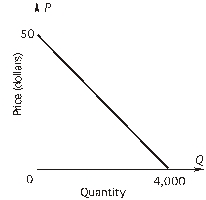
-Demand is unitary elastic at P = $________.
A) 5
B) 10
C) 15
D) 20
E) 25

-Demand is unitary elastic at P = $________.
A) 5
B) 10
C) 15
D) 20
E) 25

Unlock Deck
Unlock for access to all 77 flashcards in this deck.
Unlock Deck
k this deck
64
Refer to the following figure:

-At a price of $6, the point elasticity of demand for D1 is ________ and marginal revenue is _______.
A) -5; positive
B) -0.5; negative
C) -0.2; negative
D) -; zero

-At a price of $6, the point elasticity of demand for D1 is ________ and marginal revenue is _______.
A) -5; positive
B) -0.5; negative
C) -0.2; negative
D) -; zero

Unlock Deck
Unlock for access to all 77 flashcards in this deck.
Unlock Deck
k this deck
65
Refer to the following figure:

-When price is $10 and quantity demanded is 2,000, what is the point elasticity of demand?
A) -3
B) -1/3
C) -1
D) -5
E) -2/3

-When price is $10 and quantity demanded is 2,000, what is the point elasticity of demand?
A) -3
B) -1/3
C) -1
D) -5
E) -2/3

Unlock Deck
Unlock for access to all 77 flashcards in this deck.
Unlock Deck
k this deck
66
Refer to the following figure:

-When quantity demanded is 3,000, what is marginal revenue?
A) $12
B) $15
C) 0
D) $10
E) -$10

-When quantity demanded is 3,000, what is marginal revenue?
A) $12
B) $15
C) 0
D) $10
E) -$10

Unlock Deck
Unlock for access to all 77 flashcards in this deck.
Unlock Deck
k this deck
67
Refer to the following figure:

-Marginal revenue is zero at Q = ________.
A) 1,000 units
B) 2,000 units
C) 3,000 units
D) 4,000 units
E) none of the above

-Marginal revenue is zero at Q = ________.
A) 1,000 units
B) 2,000 units
C) 3,000 units
D) 4,000 units
E) none of the above

Unlock Deck
Unlock for access to all 77 flashcards in this deck.
Unlock Deck
k this deck
68
Refer to the following figure:

-At a price of $1, the point elasticity of demand for D2 is ________ and marginal revenue is _______.
A)-5; positive
B) -0.5; negative
C)-0.2; negative
D) -1; zero

-At a price of $1, the point elasticity of demand for D2 is ________ and marginal revenue is _______.
A)-5; positive
B) -0.5; negative
C)-0.2; negative
D) -1; zero

Unlock Deck
Unlock for access to all 77 flashcards in this deck.
Unlock Deck
k this deck
69
Suppose the demand for good X is . This demand curve has a ________ (constant, variable) elasticity of demand equal to ________.
A) variable; -0.5
B) constant;-0.2
C) constant; -1
D) variable;-2
A) variable; -0.5
B) constant;-0.2
C) constant; -1
D) variable;-2

Unlock Deck
Unlock for access to all 77 flashcards in this deck.
Unlock Deck
k this deck
70
Refer to the following figure:

-When price is $5 and quantity demanded is 3,000, what is the point elasticity of demand?
A) -3
B) -1/3
C) -1
D) -5
E) -2/3

-When price is $5 and quantity demanded is 3,000, what is the point elasticity of demand?
A) -3
B) -1/3
C) -1
D) -5
E) -2/3

Unlock Deck
Unlock for access to all 77 flashcards in this deck.
Unlock Deck
k this deck
71
Refer to the following figure:

-At a price of $10, the point elasticity of demand for D3 is ________ and marginal revenue is _______.
A) -5; positive
B) -0.5; negative
C) -0.2; negative
D) -1; zero

-At a price of $10, the point elasticity of demand for D3 is ________ and marginal revenue is _______.
A) -5; positive
B) -0.5; negative
C) -0.2; negative
D) -1; zero

Unlock Deck
Unlock for access to all 77 flashcards in this deck.
Unlock Deck
k this deck
72
Refer to the following figure:

-What is the equation for marginal revenue?
A) MR = 4,000 -0.005P
B) MR = 4,000 -200Q
C) MR = 4,000 -200P
D) MR = 20 - 0.01Q
E) MR = 20 - 200Q

-What is the equation for marginal revenue?
A) MR = 4,000 -0.005P
B) MR = 4,000 -200Q
C) MR = 4,000 -200P
D) MR = 20 - 0.01Q
E) MR = 20 - 200Q

Unlock Deck
Unlock for access to all 77 flashcards in this deck.
Unlock Deck
k this deck
73
Refer to the following figure:

-When price is $15 and quantity demanded is 1,000, what is the point elasticity of demand?
A) -3
B) -1/3
C)-1
D) -5
E) -2/3

-When price is $15 and quantity demanded is 1,000, what is the point elasticity of demand?
A) -3
B) -1/3
C)-1
D) -5
E) -2/3

Unlock Deck
Unlock for access to all 77 flashcards in this deck.
Unlock Deck
k this deck
74
Refer to the following figure:

-When quantity demanded is 1,000, what is marginal revenue?
A) $15
B) $7.50
C) 0
D) $10
E) -$10

-When quantity demanded is 1,000, what is marginal revenue?
A) $15
B) $7.50
C) 0
D) $10
E) -$10

Unlock Deck
Unlock for access to all 77 flashcards in this deck.
Unlock Deck
k this deck
75
Refer to the following figure:

-The equation for marginal revenue is
A) MR = 50 -0.025Q.
B) MR = 4,000 - 2,000Q.
C) MR = 4,000 - 100Q.
D) MR = 50-160Q.
E) none of the above

-The equation for marginal revenue is
A) MR = 50 -0.025Q.
B) MR = 4,000 - 2,000Q.
C) MR = 4,000 - 100Q.
D) MR = 50-160Q.
E) none of the above

Unlock Deck
Unlock for access to all 77 flashcards in this deck.
Unlock Deck
k this deck
76
Refer to the following figure:

-The equation for demand is
A) P = 4,000 -50Q.
B) P = 4,000 - 80Q.
C) Q = 4,000 - 50P.
D) Q = 50 -80P.
E) none of the above

-The equation for demand is
A) P = 4,000 -50Q.
B) P = 4,000 - 80Q.
C) Q = 4,000 - 50P.
D) Q = 50 -80P.
E) none of the above

Unlock Deck
Unlock for access to all 77 flashcards in this deck.
Unlock Deck
k this deck
77
Refer to the following figure:

-The point elasticities of demand for D1, D2, and D3 at a price of $5 are ________, ________, and _______, respectively.
A) -.4; -0.2; -1.4
B) -0.71;-5; -0.71
C) -1.4; -0.2; -5
D)-12; -6; -12
E) -0.0833; -0.1667; -0.0833

-The point elasticities of demand for D1, D2, and D3 at a price of $5 are ________, ________, and _______, respectively.
A) -.4; -0.2; -1.4
B) -0.71;-5; -0.71
C) -1.4; -0.2; -5
D)-12; -6; -12
E) -0.0833; -0.1667; -0.0833

Unlock Deck
Unlock for access to all 77 flashcards in this deck.
Unlock Deck
k this deck


